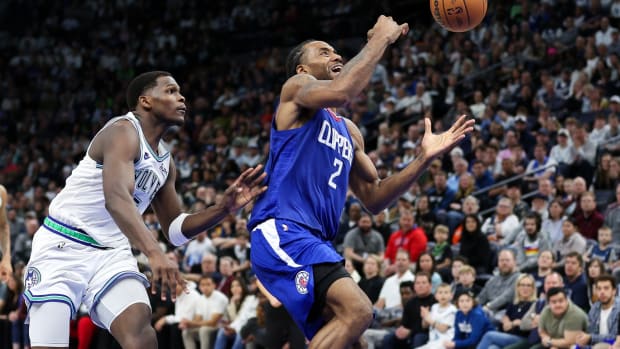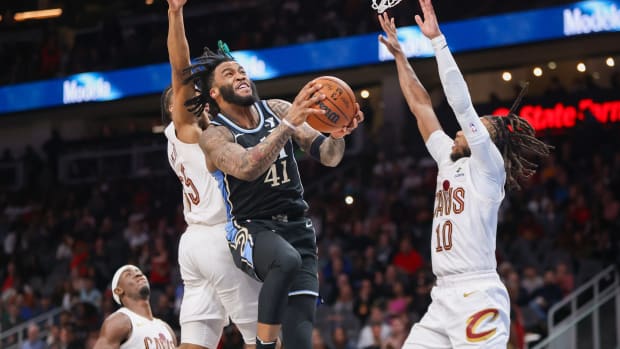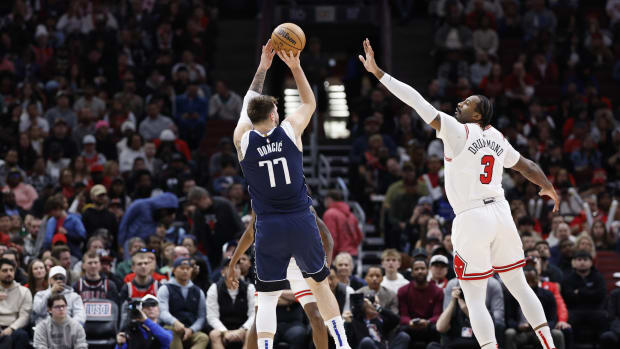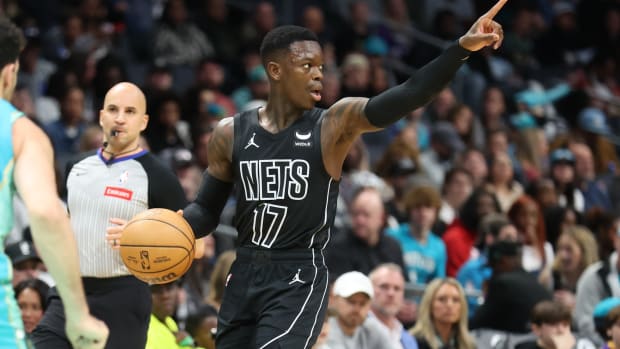
Heat can't rely on LeBron James alone in decisive Game 7 against Pacers
LeBron James finished with 29 points while the other Heat starters combined for just 25 points in a Game 6 loss. (Nathaniel S. Butler/NBAE via Getty Images)
No offense featuring LeBron James at its center could ever be toothless. But in Game 6 of the Eastern Conference finals, the most explosive team in the regular season was reduced to the contributions of a single star and a burst of hot three-point shooting, producing just 77 points as the Pacers evened the series with the Heat at 3-3.
The Heat, known for their potent dribble-drive offense in the regular season, were held to 32 percent shooting in the paint and 25 percent inside the arc. James, who finished with 29 points (on 21 shots), six assists and seven rebounds, did what he could. But with no teammate creating competently (Dwyane Wade and Chris Bosh combined for 15 points on 4-of-19 shooting), James was essentially left to fend for himself against the top defensive team in the league.
Wade simply is a shadow of his former self at the moment, a development that tags James with even more ball-handling responsibility and neuters Miami's larger offensive efforts. His inability to finish hurts the Heat badly, but worse is Wade's more general lack of explosion and inability to create. In Game 6, Wade posted just one assist to two turnovers in 34 minutes, which, when juxtaposed with his 3-of-11 shooting, fairly articulates how ineffective he was off the bounce. Every dribble he took on Saturday seemed either desperate or defensive, serving only to remind of the glaring difference between what he was capable of and what Miami needed.
THOMSEN: Heat searching for rhythm entering Game 7 |East finals hub page
As a a result of Wade's feckless play, Indiana has found an ideal balance in challenging him in select situations while deserting him to help or double-team in others. For that reason, Wade contributes to the Heat's problems even when he's not directly involved in the play. He can't control the ball because the Pacers understand all that he cannot do in his present form, and yet he doesn't offer much as an off-ball threat because of his drag on Miami's spacing. Wade has been able to get a few backdoor cuts for easy scores throughout the series, but not nearly enough to account for the greater absence of his offensive game.
Without a fully functional Wade, James doesn't have much opportunity to work off the ball, for fear of more possessions like this one where he is the lone creator on the floor:
The stuff championship dreams are made of, truly.
MAHONEY: How Pacers are slowing down Heat
With a crucial source of counter-driving and playmaking operating at less than full strength and a vested interest in avoiding the above, Miami simplified its offense to feature more direct feeds to James in the post and a bevy of high, dry pick-and-rolls. The first option was countered rather easily, in part because Miami's static formation made this basic offense easy to defend. Paul George did a fantastic job of encouraging James to take long jumpers, and on the occasions in which LeBron looked to get deeper into the paint, Indiana's D was all over the potential kick-out pass:
As for the pick-and-roll sequences, James had success in keeping the ball and attacking whatever opening he could find. But he got no help as Bosh missed opportunity after opportunity and the Heat's shooters found space hard to come by. It reached the point where the best pick-and-roll possibilities included using point guards Norris Cole and Mario Chalmers as James' screeners, even when doing so put those spotty decision-makers in a position to make difficult, split-second reads against a savvy defensive front. Given the way James' teammates struggled to make shots or the right passes, one can understand why he kept the ball so often.
[polldaddy poll=7148658]
But only so much good can come from an offense so static, even with James in a position of control. He's talented and imposing enough to create offense on his own, but best when both he and his teammates are put in positions to succeed. Perhaps some advantage can be gained in more consistently establishing James at the elbow, a space on the floor from which he dominated and drew defensive attention in Game 5, or in trusting Chalmers or Cole in sets with more structure and direction. Regardless, it seems imperative that the Heat rediscover some aspect of their regular-season form. Every part of Miami's floor-spreading offense won't work in this context, but there are changes to be made in approach and execution that could create a better support system for James despite his teammates' troubles.
Miami seems to pay a hefty price in this series whenever it goes small, and seemingly can't rely on Wade to help manufacture points in bigger lineups. But the Heat will have to find some degree of success in both. Big men Tyler Hansbrough and David West can't be allowed to guard Ray Allen and Shane Battier without penalty (they're shooting 7-of-24 and 2-of-15 from three-point range, respectively, in the series), and Wade has to be put on the move to at least force the Pacers' defense to react to his presence. The ball will undoubtedly be in James' hands on many possessions, but the Heat can't stop and redirect the ball his way at every turn, nor hinge an entire offense to his ability to create.
To do so is to abandon all that Miami does so well. Open three-pointers and looks in the paint will come less often against such a well-executing defense, but Game 6 represented an overreaction from Miami. Part of what makes James -- and Miami on the whole -- so difficult to defend is that he represents a constantly shifting target. He gets catches all over the floor and participates in all kinds of play actions, straining the defense in a wide variety of ways. And yet on Saturday the Heat forced James into an all too consistent role as a high pick-and-roll ball handler with few kick-out options. Repetition made James and the Heat that much easier to defend, and sacrificed all of the smart quirks embedded in an offense that's far more flexible than it showed.
It's essential for even great offensive teams to move and adjust over the course of a series, and the motivation to have James dominate the ball in a sequence that's easy to initiate is understandable. But the Heat diverted so clearly from the ball and player movement that sustains their offense that it should come as little surprise that Miami ended with a mere 77 points in Game 6. This was a winnable game for the Heat with a few minutes left, as an unlikely late-game run put them in striking position, but James can only bring them so far.
If Miami’s offense retains that same dull strategic tenor in Game 7 on Monday, the Eastern Conference finals are likely Indiana’s to lose. Game 6 showcased what is essentially the blandest way possible to make use of the best basketball player on the planet, and it was a stark regression from Miami’s more imaginative regular-season offense. Wade isn’t himself and Bosh isn’t on point, but Game 7 will be a test of counter-tactics and preparation for a coaching staff that hasn’t been challenged to this degree in a long while.



































